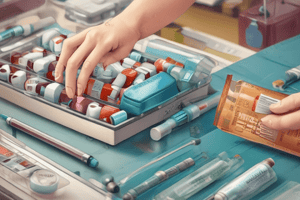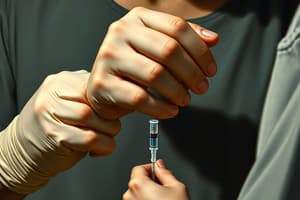Podcast
Questions and Answers
If the patient/client says he feels shaky and is sweating and complains of a headache, what should you do?
If the patient/client says he feels shaky and is sweating and complains of a headache, what should you do?
Foods with concentrated sugars include:
Foods with concentrated sugars include:
True or False: Insulin is a cure for diabetes.
True or False: Insulin is a cure for diabetes.
What is required for unlicensed personnel to give medication?
What is required for unlicensed personnel to give medication?
What is the dose of a medication referring to?
What is the dose of a medication referring to?
What does the route of medication administration refer to?
What does the route of medication administration refer to?
What must be known before giving a patient/client their medications?
What must be known before giving a patient/client their medications?
When should insulin be administered?
When should insulin be administered?
Why is insulin not taken orally?
Why is insulin not taken orally?
What should be done if blood is drawn into the insulin syringe?
What should be done if blood is drawn into the insulin syringe?
Why is documentation of insulin administration crucial?
Why is documentation of insulin administration crucial?
Who supervises the administration of insulin under RN delegation?
Who supervises the administration of insulin under RN delegation?
Why should insulin injections be given in different sites?
Why should insulin injections be given in different sites?
What is the purpose of testing blood sugar levels using a glucose meter?
What is the purpose of testing blood sugar levels using a glucose meter?
Who determines the type of insulin to be used?
Who determines the type of insulin to be used?
What happens if there are discrepancies in the insulin dose?
What happens if there are discrepancies in the insulin dose?
What is the role of the RN during supervision visits?
What is the role of the RN during supervision visits?
Why is it important to maintain compliance with correct insulin administration and glucose monitoring procedures?
Why is it important to maintain compliance with correct insulin administration and glucose monitoring procedures?
Who will teach the procedure for testing blood sugar levels using a glucose meter?
Who will teach the procedure for testing blood sugar levels using a glucose meter?
What controls insulin production in non-diabetics?
What controls insulin production in non-diabetics?
Why do people with diabetes often require regular eating?
Why do people with diabetes often require regular eating?
What should be done if a patient experiences nausea or vomiting?
What should be done if a patient experiences nausea or vomiting?
What are symptoms of low blood sugar that require immediate notification of a healthcare professional?
What are symptoms of low blood sugar that require immediate notification of a healthcare professional?
What should be offered to conscious patients with low blood sugar?
What should be offered to conscious patients with low blood sugar?
What is advised if a person loses consciousness due to low blood sugar?
What is advised if a person loses consciousness due to low blood sugar?
What can change insulin needs in patients?
What can change insulin needs in patients?
Who can order insulin dosage?
Who can order insulin dosage?
Who must notify healthcare professionals of any changes in insulin patients?
Who must notify healthcare professionals of any changes in insulin patients?
What is a test for insulin administration by unlicensed personnel likely to include?
What is a test for insulin administration by unlicensed personnel likely to include?
What is crucial for insulin administration by unlicensed personnel?
What is crucial for insulin administration by unlicensed personnel?
What is controlled by glucose levels and the hormone glucagon in non-diabetics?
What is controlled by glucose levels and the hormone glucagon in non-diabetics?
What are the 5 Rights of medication administration?
What are the 5 Rights of medication administration?
What should unlicensed personnel do if pills are mixed up or missing?
What should unlicensed personnel do if pills are mixed up or missing?
Who is responsible for the disposal of medications that are dropped or become unusable?
Who is responsible for the disposal of medications that are dropped or become unusable?
What must be documented when medication is given?
What must be documented when medication is given?
What is the responsibility of unlicensed personnel regarding unusable medication?
What is the responsibility of unlicensed personnel regarding unusable medication?
When is insulin administration by unlicensed personnel allowed?
When is insulin administration by unlicensed personnel allowed?
What can lead to serious complications if untreated in diabetes?
What can lead to serious complications if untreated in diabetes?
How can diabetes be managed?
How can diabetes be managed?
How is insulin administered?
How is insulin administered?
What is the responsibility of unlicensed personnel regarding potential side effects of medication?
What is the responsibility of unlicensed personnel regarding potential side effects of medication?
Can training for insulin administration be transferred between patients?
Can training for insulin administration be transferred between patients?
What is the cause of diabetes?
What is the cause of diabetes?
Study Notes
Medication Administration Guidelines and Insulin Administration Training
- Medication administration involves the 5 Rights: Right Patient/Client, Medication, Dose, Route, and Time
- Unlicensed personnel can place medications in a pill box and administer them if trained and supervised
- If pills are mixed up or missing, the supervisor should be notified immediately, and medications should not be given
- Documentation of medication given, including name, strength, dose, amount, route, and time, is crucial
- Disposal of medications that are dropped or become unusable is the responsibility of the RN/Supervisor
- Unlicensed personnel must not throw away medication and should keep unusable medication in a safe place for proper disposal
- The unlicensed person's responsibility includes being aware of potential side effects of medication and when to contact the RN or office
- Insulin administration by unlicensed personnel is allowed under direct supervision after proper training
- Diabetes is caused by inadequate insulin production or inability to use insulin effectively, leading to serious complications if untreated
- Diabetes can be managed through diet, weight loss, exercise, and medications, such as those stimulating insulin production
- Insulin can only be administered through injection and requires specific training and supervision
- Training for insulin administration cannot be transferred between patients; each patient must be individually trained
Studying That Suits You
Use AI to generate personalized quizzes and flashcards to suit your learning preferences.





